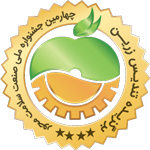About Barij
Barij Essential Pharmaceutical Company is a manufacturer of herbal medicines and the first pharmaceutical knowledge-based company in the country. This company was established in 1992 with the aim of improving and promoting the health of the community.
Factory: Kashan Mashhad Ardehal | Phone: 4002 (086)
Tehran Office: Marzdaran St., between Ariafar and Sarsabz, No. 78
The use of content is prohibited only for non-commercial purposes and with reference to the source. All material and intellectual rights of this site belong to Barij Essence Holding.




